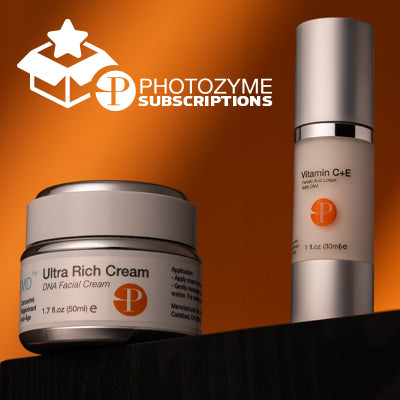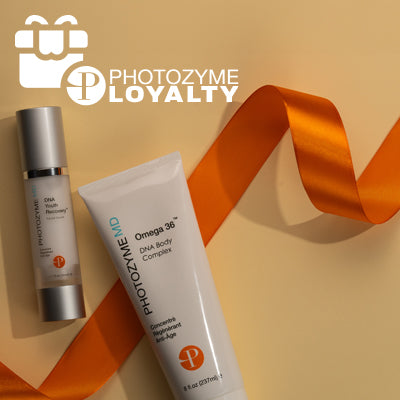
Key Takeaways:
- Sunscreen: A Year-Round Essential: Sunscreen is crucial even in winter due to persistent UVA and underestimated UVB ray exposure.
- Winter's Reflective Surfaces Increase UV Risks: Snow and ice can reflect up to 80% of UV rays, making sunscreen vital for outdoor activities.
- Prevent Photoaging With Broad-Spectrum Protection: Sunscreen on cloudy winter days protects against photoaging and supports youthful skin.
It’s critical.
As the temperatures drop and the days grow shorter, many of us store our sunscreen and summer attire away. But this ignores whether you should wear sunscreen in the winter. Contrary to common belief, the need for sun protection doesn’t end with summer. Winter brings its own unique set of challenges that make sunscreen equally essential.
At Photozyme LLC, we understand the importance of maintaining healthy skin year-round. As specialists in skincare based in Carlsbad, CA, we emphasize the significance of comprehensive skin protection as part of an effective anti-aging and skincare regimen.
In this article, we’ll examine why incorporating sunscreen into your winter skincare routine is essential for sustaining youthful, healthy skin. We’ll also discuss the importance of UV protection during the winter and how Photozyme's innovation in skin care products can complement your sun protection efforts and contribute to robust, age-defying skin care.
Understanding Ultraviolet Radiation: UVA vs. UVB
When considering whether you should wear sunscreen in the winter, it's essential to understand the types of ultraviolet (UV) radiation and how they impact your skin. UV radiation from the sun comes in two primary types: UVA and UVB rays, each with different characteristics and effects on the skin.
UVA Rays: The Aging Rays
UVA rays, also known as aging rays, make up the majority of our UV exposure. These rays penetrate deeply into the skin, reaching the dermis, where they can damage the collagen fibers. This damage leads to premature skin aging, characterized by wrinkles, loss of elasticity, and age spots. UVA rays can penetrate clouds and glass, meaning your skin is exposed to them during all daylight hours, regardless of the season or weather. They are also present with nearly equal intensity during all daylight hours throughout the year, making protection against UVA rays crucial year-round.
UVB Rays: The Burning Rays
UVB rays, known as burning rays, are the primary cause of sunburn. These rays affect the outer layer of the skin, the epidermis, and are most intense during the summer months, especially between 10 a.m. and 4 p.m. However, unlike UVA rays, UVB rays can vary in intensity throughout the year and are weaker in the winter. But don't be fooled; UVB rays can still harm your skin in the colder months, especially at high altitudes or on reflective surfaces like snow or ice, which can bounce back up to 80% of the rays, doubling your exposure.
Why Protection Matters Year-Round
Given the persistent threat posed by UVA rays throughout the year and the underestimated impact of UVB rays in colder seasons, it's clear that wearing sunscreen during the winter is necessary. Implementing a daily skincare routine that includes a broad-spectrum sunscreen, such as those Photozyme offers, can shield your skin from these harmful rays. Broad-spectrum sunscreens are formulated to protect against both UVA and UVB rays, ensuring comprehensive skin protection regardless of the season.
Cloud Cover Does Not Equal UV Protection
During the colder months, a common misconception is that cloud cover can be a natural barrier against the sun's harmful UV rays. However, this is far from the truth. Understanding the relationship between cloud cover and UV radiation is crucial for protecting your skin, even on overcast winter days.
- Cloud Cover Doesn't Block UV Rays: Up to 80% of UV rays penetrate through clouds, making sun protection essential even on overcast winter days.
- Snow & Ice Increase UV Exposure: Reflecting up to 90% of UV rays, snow and ice can double your overall UV exposure during winter activities.
- UV Radiation Contributes To Premature Aging: Even in winter, persistent UV exposure can lead to sunburn, premature aging, and increased skin cancer risk.
- Sunscreen: A Winter Skincare Must-Have: Sunscreen is vital year-round to maintain skin health and combat the effects of UV radiation.
- Photozyme Products Combine Protection & Care: Products like BEYONDbloc and DNA Youth Recovery Facial Serum protect against UV damage while supporting skin recovery and anti-aging.
Sunscreen And Photoaging: How It Protects Your Youthful Skin
Understanding the impact of photoaging is critical when considering the health and youthfulness of your skin. Photoaging refers to premature skin aging caused by repeated exposure to ultraviolet (UV) radiation, primarily from the sun This process accelerates the natural aging process, leading to visible signs such as wrinkles, fine lines, and hyperpigmentation. While most people associate sunscreen use with the warmer, sunnier months, it is a crucial defense against photoaging year-round, even during the winter.
Sunscreen: A Year-Round Necessity
According to the Skin Cancer Foundation, the misconception that sunscreen is only necessary when sunny outside overlooks that up to 80% of UV rays can penetrate clouds. Furthermore, snow and ice can reflect up to 90% of UV rays, increasing your exposure, especially in the face area, which remains uncovered most of the time. This means the risk of photoaging and skin damage does not diminish—instead, it can even escalate in winter due to the reflective surfaces.
Daily Sunscreen Use: Your Best Defense
Incorporating high-quality sunscreen into your daily skincare routine, regardless of the season, is a key step in protecting your skin from these harmful UV rays. Products like Photozyme's unique formulations, which combine innovative and proprietary ingredients, offer UV protection and ingredients aimed at correcting the visible signs of photoaging. Their products address various skin concerns, including anti-aging, through mechanisms that help repair and protect the skin's DNA from further damage.
Combating Dry Skin And Sun Protection Simultaneously
In the colder months, battling dry skin becomes a top priority for many. However, it's essential not to neglect sun protection amidst this fight. A common misconception is that the sun's rays are less harmful during winter, leading many to question whether you should wear sunscreen in the winter. And it turns out that doing so can simultaneously address concerns of moisturization and protection against UV damage.
Hydrating Sunscreens: Addressing Dryness And Protection
Choosing sunscreens that also offer hydrating benefits is vital for those dealing with dry skin during the colder months. Products like Photozyme's BEYONDbloc provide high-level protection from the sun's harmful rays and contain ingredients that help nourish and hydrate the skin, tackling the issue of winter dryness head-on. This dual-action approach ensures that the skin remains protected from the sun and adequately moisturized, helping to fend off the dry, cracked, and irritated skin that often accompanies colder weather.
Choosing The Right Sunscreen For Cold Weather
The winter environment poses unique challenges to your skin, from UV rays and harsh, dry climates to indoor heating systems that can deplete skin moisture.
Here's how you can choose the right sunscreen to protect against sun damage and support your skin’s health during the colder months:
1. Look For Broad-Spectrum Protection
Regardless of the season, choosing a sunscreen that offers broad-spectrum protection is vital. This ensures coverage against UVA (aging) rays, which can penetrate your skin deeply and lead to premature aging, and UVB (burning) rays, which are responsible for sunburn. Photozyme’s BEYONDbloc is an example of a sunscreen that offers broad-spectrum protection, ideal for safeguarding your skin from the full range of UV damage.
2. Consider A Higher SPF
While an SPF (Sun Protection Factor) of 30 is the minimum recommendation for effective sun protection, winter sports and activities may require a higher SPF. This is especially true for activities like skiing and snowboarding, where reflective snow can increase UV exposure. Opting for a sunscreen with an SPF of 50 or higher can provide the added protection needed for these conditions.
3. Moisturizing Ingredients
Winter air can be extremely dry, stripping the skin of its natural moisture, which is why selecting a sunscreen with moisturizing ingredients is beneficial. Look for sunscreens that include hydrating components such as glycerin, hyaluronic acid, and ceramides. Photozyme's Ultra Rich Cream offers vital sun protection and is infused with moisture-rich ingredients that help maintain the skin’s hydration levels during cold weather.
4. Water Resistance
For those engaging in winter sports or activities that might cause sweating or exposure to moisture, using a water-resistant sunscreen is a must. This ensures that your skin remains protected even in wet or snowy conditions. Water-resistant formulas typically maintain SPF protection for 40 to 80 minutes in water.
5. Sensitive Skin Formulas
Cold weather can exacerbate skin sensitivity, making it important to choose sunscreens formulated for sensitive skin if you're prone to irritation. These formulations are generally free from potential irritants like fragrances and parabens. Photozyme’s product range, designed to meet various skin needs, offers gentle formulations on the skin while delivering effective protection and care.
Final Thoughts
The importance of wearing sunscreen in the winter cannot be overstressed. While the chill in the air may deceive you into thinking the sun's rays are less harmful, UV radiation remains a constant threat to skin health in any season. Photoaging and skin damage can occur even on the cloudiest winter days therefore, incorporating sunscreen into your daily skincare routine is a non-negotiable act of self-care.
For those who are particularly mindful of skin aging and the overall health of their skin, integrating products that offer both protection and nourishment is key. Photozyme is committed to innovative skincare solutions and offers products like the GFS Plus Night Serum. Alongside daily sunscreen use, this serum can significantly reduce the appearance of fine lines and wrinkles, ensuring your skin remains youthful and vibrant.
Read also:
- How To Naturally Heal Sun-Damaged Skin: Tips For Your Face
- How Often Should You Reapply Sunscreen: Maximum Protection
- What Is SPF? Understanding Sun Protection
Frequently Asked Questions About Should You Wear Sunscreen In The Winter
Does UV radiation decrease during winter?
While the strength of UVB rays decreases in winter, UVA rays, which penetrate the skin more deeply, remain constant year-round. These rays can contribute to premature skin aging and skin cancer, making sunscreen just as essential in the colder months.
Why is sunscreen important on cloudy winter days?
Up to 80% of UV rays can penetrate through clouds, meaning you're still at risk for UV exposure, even on overcast days. Applying sunscreen can protect your skin from these harmful rays, reducing your risk of skin damage.
Do I need to use sunscreen if I'm inside all day?
If you're near windows, the answer is yes. UVA rays can penetrate glass, so if you're working near a window or driving for extended periods, applying a broad-spectrum sunscreen can provide the necessary protection.
How does snow affect UV exposure?
Snow reflects up to 80% of UV rays, significantly increasing your exposure, especially at higher altitudes. This makes sunscreen an indispensable part of your winter skincare routine, particularly if you're participating in snow sports.
Can I still get sunburned in winter?
Absolutely. The combination of UV radiation and the snow reflection can lead to sunburn. It's a common misconception that sunburn is less likely in winter, but the risk remains, making sunscreen necessary.
What SPF should I use in winter?
Dermatologists recommend using a broad-spectrum sunscreen with an SPF of at least 30, regardless of the season. This level of protection effectively blocks a significant amount of UV radiation.




